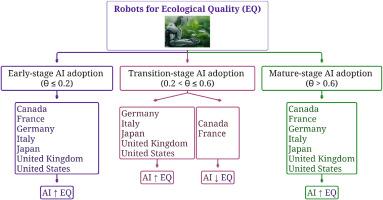Industrial robots for a sustainable future: Uncovering the asymmetric effects of AI on ecological quality in G7 economies
IF 12.5
1区 社会学
Q1 SOCIAL ISSUES
引用次数: 0
Abstract
Artificial intelligence is increasingly recognized for its potential to enhance ecological quality by streamlining production processes, reducing environmental emissions, and improving ecological monitoring systems. However, the influence of artificial intelligence on ecological quality is neither uniform across different stages of technological adoption nor consistent across national contexts. The central objective of this study is to investigate the asymmetric and stage-specific effects of artificial intelligence adoption on ecological quality within the Group of Seven (G7) economies over the period from January 2000 to December 2019. Employing a novel multivariate quantile-on-quantile regression framework, this research examines how varying intensities of artificial intelligence adoption impact different levels of ecological outcomes. The results indicate that artificial intelligence exerts a modest positive effect on ecological quality during early stages of adoption, a more substantial effect during transitional phases, and a significantly positive influence at advanced stages of integration. To address endogeneity concerns—particularly reverse causality and omitted variable bias—this study utilizes an instrumental variable multivariate quantile regression approach, using lagged values of artificial intelligence adoption as an instrument. The findings are validated through robustness checks using kernel regularized least squares and standard quantile regression techniques. The results also reveal considerable variation across countries, highlighting the necessity for country-specific and stage-aware policy interventions. Accordingly, the study offers detailed, actionable recommendations tailored to the adoption stage of each G7 member to maximize the ecological benefits of artificial intelligence. This research provides a rigorous, causally grounded analysis of how artificial intelligence can be harnessed to advance environmental sustainability in highly industrialized economies.

可持续未来的工业机器人:揭示人工智能对七国集团经济体生态质量的不对称影响
人工智能通过简化生产流程、减少环境排放和完善生态监测系统,在提高生态质量方面的潜力日益得到认可。然而,人工智能对生态质量的影响在技术采用的不同阶段既不统一,在国家背景下也不一致。本研究的中心目标是调查2000年1月至2019年12月期间七国集团(G7)经济体采用人工智能对生态质量的不对称和阶段性影响。本研究采用一种新颖的多元分位数对分位数回归框架,探讨了不同程度的人工智能采用对不同程度生态结果的影响。结果表明,人工智能对生态质量的正向影响在采收早期有一定程度的影响,在过渡阶段有较大的影响,在整合后期有显著的正向影响。为了解决内生性问题——特别是反向因果关系和遗漏的变量偏差——本研究利用工具变量多变量分位数回归方法,使用人工智能采用的滞后值作为工具。通过使用核正则化最小二乘法和标准分位数回归技术进行鲁棒性检查,验证了研究结果。结果还揭示了各国之间的巨大差异,突出了针对具体国家和阶段的政策干预的必要性。因此,该研究为每个G7成员国的采用阶段提供了详细的、可操作的建议,以最大限度地提高人工智能的生态效益。这项研究为如何利用人工智能来促进高度工业化经济体的环境可持续性提供了严格的、基于因果关系的分析。
本文章由计算机程序翻译,如有差异,请以英文原文为准。
求助全文
约1分钟内获得全文
求助全文
来源期刊

Technology in Society
Multiple-
CiteScore
17.90
自引率
14.10%
发文量
316
审稿时长
60 days
期刊介绍:
Technology in Society is a global journal dedicated to fostering discourse at the crossroads of technological change and the social, economic, business, and philosophical transformation of our world. The journal aims to provide scholarly contributions that empower decision-makers to thoughtfully and intentionally navigate the decisions shaping this dynamic landscape. A common thread across these fields is the role of technology in society, influencing economic, political, and cultural dynamics. Scholarly work in Technology in Society delves into the social forces shaping technological decisions and the societal choices regarding technology use. This encompasses scholarly and theoretical approaches (history and philosophy of science and technology, technology forecasting, economic growth, and policy, ethics), applied approaches (business innovation, technology management, legal and engineering), and developmental perspectives (technology transfer, technology assessment, and economic development). Detailed information about the journal's aims and scope on specific topics can be found in Technology in Society Briefings, accessible via our Special Issues and Article Collections.
 求助内容:
求助内容: 应助结果提醒方式:
应助结果提醒方式:


